
Watch the vlog

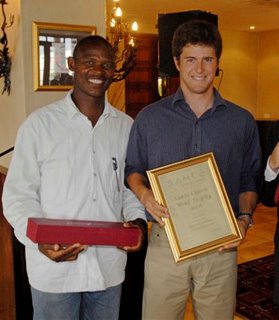 brings a level of commitment and an obsession with quality that has been embedded into his psyche by Phil. You will be hearing much more about Edward in the future. edward@vilafonte.com
brings a level of commitment and an obsession with quality that has been embedded into his psyche by Phil. You will be hearing much more about Edward in the future. edward@vilafonte.com

 Zelma and Phil are in South Africa and we will be hosting a couple of events to showcase the wines to the media, the trade and our vluable consumers. We are very proud of this vintage and feel that it accurately mirrors our efforts and the progress that we are making in our vineyards and our winemaking. The nuances of flavour and aroma that characterise the Vilafonte vineyard surface once again and the linear typicity borne from viticulturally significant winegrowing is put on a platform - astounding really and an exciting step forward. We are sure that the wines will show beautifully.
Zelma and Phil are in South Africa and we will be hosting a couple of events to showcase the wines to the media, the trade and our vluable consumers. We are very proud of this vintage and feel that it accurately mirrors our efforts and the progress that we are making in our vineyards and our winemaking. The nuances of flavour and aroma that characterise the Vilafonte vineyard surface once again and the linear typicity borne from viticulturally significant winegrowing is put on a platform - astounding really and an exciting step forward. We are sure that the wines will show beautifully. 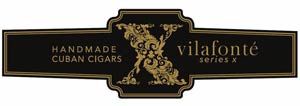 Vilafonte Series C Cuban cigar is an excellent mild cigar designed as the perfect accompaniment to our full-bodied and highly structured wines. Please contact me on mike@vilafonte.com if you are interested in participating in our wine and cigar program in your establishment or would like to purchase some for your home. I will publish a tasting note of our exciting new cigar shortly. It will also be on our website soon at www.vilafonte.com
Vilafonte Series C Cuban cigar is an excellent mild cigar designed as the perfect accompaniment to our full-bodied and highly structured wines. Please contact me on mike@vilafonte.com if you are interested in participating in our wine and cigar program in your establishment or would like to purchase some for your home. I will publish a tasting note of our exciting new cigar shortly. It will also be on our website soon at www.vilafonte.com 
 the gold medal for South Africa with our maiden vintage - the 2003 'Series C' which is only now starting to open up and show it's true colours. Great news considering the strict judging criteria of the International Wine Challenge - the worlds largest and most authoritative comeptition authority. We are very proud!
the gold medal for South Africa with our maiden vintage - the 2003 'Series C' which is only now starting to open up and show it's true colours. Great news considering the strict judging criteria of the International Wine Challenge - the worlds largest and most authoritative comeptition authority. We are very proud!Today’s PODCAST from
DOWNLOAD TELL A FRIEND PLAY
Distribution in America is the key to success. Like anywhere in the
world, ‘route to market’ is always going to be the killer attribute that can
mean the difference between success and failure. Nowhere in the world is
this more apparent than in the United States where the neo-prohibitionist
hangover of federal liquor controls hangs thick in the air. Americans, it
seems, have reached an uneasy state of acceptance of this extraordinary
status quo where every facet of a wines journey to the end consumer pads
somebody’s pocket. To recapr for those who are confised by these statements.
America (generally) has a 3 tiered system of wine distribution whereby the
non-American producer cannot legally sell wine to anyone but a wine
importer. The absurdity starts when you understand that no single person or
business entity may own both a distribution and import license. What this
means is that the importer cannot sell wine to the consumer or even the
retailer/restaurateur and can only sell wine toa distributor who in turn can
also only sell wine to the trade. Technically speaking, the only place a
consumer can gain access to imported wines is through the 3rd tier of the
channel which is the retailer or restaurateur. Once you understand the
vastness of the US market, it is understandable that perhaps this system
would have evolved independently as few companies have the infrastructure
and capabilities to own and distribute nationally with efficiency. But the
system really falls down in the sense that it suppresses free market
activities and that the larger National distributors have little in the way
of competition. As a result of this and to further entrench this skewed
power balance, the larger distributors are being consolidated at a rate
that is unprecedented and fewer distributors are controlling more of the
market. It feels sometimes that every medium-size distributor in the US is
simply waiting for the ‘big guys’ to come along and buy them out. Might I be
over-dramatising this? Maybe, but this is the feeling on the ground.
So what does this mean for South Africa? Well, for every distributor that
gets purchased, this means fewer distribution slots for South African wines
exist and fewer small producers are able to participate in what becomes a
much larger structure. The larger a distributor gets, the larger the
supplier has to become in order to become a meaningful contributor to bottom-
line. The big brands become bigger and the smaller brands get squeezed out.
The consolidation of distribution and ongoing production fragmentation
continues apace. The two trends are not compatible and we will have to win
over some serious buyers to grow South African wine in the US – usually at
the expense of another global supplier.
So where are the opportunities?
The federal and state regulators are slowly (very slowly) dismantling the
complex wine distribution laws, but a combineation of big business
(distributor) lobbying in Washington, a very religious and conservative
population and misplaced priorities is hampering this progress. A high-
profile battle between retail giant Costco and the state of Washington
recently threw up a couple of clues about the future when Costco won the
first step in the battle to allow it to ship directly from the producer. Of
course this judgement will go to appeal and will probably be held up for
years, but Costco is being aggressive and has set a valuable precedent which
any sensible judge cannot fail to respect.
Is this a good thing? Well, yes and no as it si being championed by the
mammoth retailers and you can be sure that they are not pursuing a
Samaritanian endeavour to make money for the supplier – no, they are chasing
margin for their bottom-line because they know that through direct imports
and direct shipments, that they can leverage their massive nation-wide
distribution network to exponentially multiply their sales and balloon
already embarrassing margins.
Opportunities exist for South African suppliers to find routes to market
that narrow the gap between importer, distributor and retailer. In some
states, it is (kind-of) legal for the husband to own an import license, the
wife to own a distribution license and the kids to own multiple retail
licenses. It happens – another symptom of an idiotic system. Many California
wineries drive a substantial volume of their sales through wine clubs and
direct shipments to customers. Of course there is a limited amount of states
that you can ship to directly, but this has been growing over the years. Is
there a business model here for South African wineries. Is there an
effective model for a South African winery to run a wine club for direct
sales to customers? The answer must be yes, but there has to be demand first
and brand South Africa must become more entrenched before this will work. So
the hard work lies ahead in this massive market opportunity that is the USA.
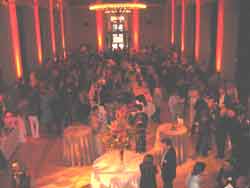 The late night arrival of Team South Africa on the East Coast with an additional 3 time-zone changes was a minor shock as the road-show rolls on. After 3 months of non-stop rain that has been seriously affecting budding and shoot-development in California, the skies finally opened on the day of the Wines of South Africa tasting downtown, a stones throw from the eponymous Embarcadero. By many accounts, this tasting has been the most successful of the tour to date. Restaurateurs, retailers and eager consumers arrived in droves and kept everyone busy with an intense interest in learning more about South African wine. It is once again clear how closely linked tourism and wine are in selling brand South Africa. A large majority of the consumers had either been to South Africa or knew of someone that was going and this provided the key draw card, in my opinion. Americans have an embarrassment of choice and this is what has made America the enormous consumer culture that it is – or was it the other way around? The
The late night arrival of Team South Africa on the East Coast with an additional 3 time-zone changes was a minor shock as the road-show rolls on. After 3 months of non-stop rain that has been seriously affecting budding and shoot-development in California, the skies finally opened on the day of the Wines of South Africa tasting downtown, a stones throw from the eponymous Embarcadero. By many accounts, this tasting has been the most successful of the tour to date. Restaurateurs, retailers and eager consumers arrived in droves and kept everyone busy with an intense interest in learning more about South African wine. It is once again clear how closely linked tourism and wine are in selling brand South Africa. A large majority of the consumers had either been to South Africa or knew of someone that was going and this provided the key draw card, in my opinion. Americans have an embarrassment of choice and this is what has made America the enormous consumer culture that it is – or was it the other way around? The 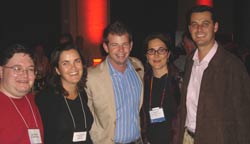 consumer, on the one hand, can be a little jaded and confused by choice. But if the message and the choice is communicated clearly and unambiguously to the consumer, they show an incredible willingness to open themselves up to trying something new. I have said this before – but feel that it is important to restate. Americans want us to teach them about our products and they want to buy them. We just need to start working on a clear message because at the moment our little wine industry does not have the financial or logistical clout to really get the message across. Sydney Harbour Bridge sells more Australian wine than you can imagine. ‘Finding Nemo’ and many other cultural icons has driven a whole generation to find Aussie interesting and exciting. We got close with Lion King – but it was really not there, was it?
consumer, on the one hand, can be a little jaded and confused by choice. But if the message and the choice is communicated clearly and unambiguously to the consumer, they show an incredible willingness to open themselves up to trying something new. I have said this before – but feel that it is important to restate. Americans want us to teach them about our products and they want to buy them. We just need to start working on a clear message because at the moment our little wine industry does not have the financial or logistical clout to really get the message across. Sydney Harbour Bridge sells more Australian wine than you can imagine. ‘Finding Nemo’ and many other cultural icons has driven a whole generation to find Aussie interesting and exciting. We got close with Lion King – but it was really not there, was it?  perhaps we are putting the cart before the horse on this one. Perhaps these producers have had an opportunity to learn a huge amount about the US market and get a feeling for how to go about positioning themselves to enter the market, but it seems like an illogical and costly entry and market research solution. The tasting this afternoon in Costa Mesa, South of LA is being hosted by a prominent retailer called Hi-Time liquors. Once again the problem is going to raise its head as the consumers can only purchase the wines that the retailer stocks, and at best wines that have Californian distribution – it’s a tough school.
perhaps we are putting the cart before the horse on this one. Perhaps these producers have had an opportunity to learn a huge amount about the US market and get a feeling for how to go about positioning themselves to enter the market, but it seems like an illogical and costly entry and market research solution. The tasting this afternoon in Costa Mesa, South of LA is being hosted by a prominent retailer called Hi-Time liquors. Once again the problem is going to raise its head as the consumers can only purchase the wines that the retailer stocks, and at best wines that have Californian distribution – it’s a tough school. 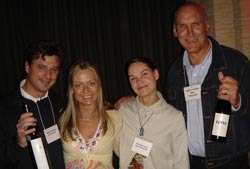 together – it has been an eye-opener for many producers and will be a catalyst for South Africa in this market. It is also a catalyst for greater cooperation in building South African wines in the US by building brand South Africa. One of the great minds behind doing just that is Yvonne Johnston at the SA International Marketing Council. It has been said that a bottle of wine in every wine shop and on every wine list in America will act as a positive reinforcer for Brand South Africa’s generic image. The wine industry has a lot to offer our marketing drive and we should not play second-fiddle. Tourism and many other SA industries engaged in marketing all have an excellent opportunity to harness synergies by partnering with WOSA – wine is exploding in America and we are in the right place at the right time – but there will not be more than one chance to get it right.
together – it has been an eye-opener for many producers and will be a catalyst for South Africa in this market. It is also a catalyst for greater cooperation in building South African wines in the US by building brand South Africa. One of the great minds behind doing just that is Yvonne Johnston at the SA International Marketing Council. It has been said that a bottle of wine in every wine shop and on every wine list in America will act as a positive reinforcer for Brand South Africa’s generic image. The wine industry has a lot to offer our marketing drive and we should not play second-fiddle. Tourism and many other SA industries engaged in marketing all have an excellent opportunity to harness synergies by partnering with WOSA – wine is exploding in America and we are in the right place at the right time – but there will not be more than one chance to get it right. 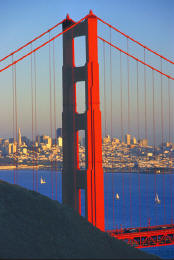 I have now arrived along with Team South Africa in beautiful (and chilly)
I have now arrived along with Team South Africa in beautiful (and chilly)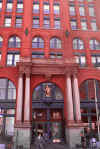

A brief video showing the space and the excellent attendacne at the WOSA New York City show a couple of days ago.
Wow, it has really been a whirlwind and things are going well so far - I am now 4 days into the tour and looking forward to meeting up with the WOSA gang in
I spent Tuesday night in Baltimore and presented a well-attended South African wine dinner at a restaurant called Abacrombie which has the reputation (I later realized) as one the best restaurants in the state of Maryland, Sonny Sweetman is the chef/owner along with his beautiful wife and they were filled to capacity with 53 people crammed in for a wonderful dinner. The cuisine was exceptional and the guests were intent on learning as much as possible – it was at this evening that it dawned on me that
After a wonderful early-morning run around historic
The next day was spent on a ‘ride-with’ (literally spending the day with a distributor sales person) doing tastings for a number of restaurants. We visited the eponymous Restaurant Eve, a great wine shop FineWine.com owned by the passionate Jonas Gustafsson. Then on to Le Paradou, an awe inspiring restaurant owned by legendary chef Yannick Cam; we tasted for at least an hour and shared rugby stories with sommelier, Nicolas Rouet who is a big South African fan. We got 2 listings on their epic winelist, the first time a wine from the Southern hemisphere has been listed – we felt very proud and decided to celebrate with a couple of cold beers at Vidalia, the famed DC eatery where we planned to meet fine wine merchant, Mike Tilch from Silesia Liquors for a 7 course tasting menu presented by Manager/Sommelier Doug Mohr. I have included (below) a video blog in which I interviewed Mike on his positive feelings about South African wines. The evening was capped with a spectacular 1970 Chateau D’ Yquem which was at the height of its powers – a very generous gift from Mike. What an evening!
A 04h45 wake-up was not really what was needed at this stage – but it had to be to catch an early flight from Dulles to
 in Rock Creek Park which is barely 5 minutes walk from my B&B. It was such a beautiful day and one can only marvel at the beauty of some of Americas parklands. Bumped into my first Starbucks coffee. Whether you are an anti-globalization activist or not – you have to admire the Starbucks ability to make a good cup of coffee – every time! OK, so engines recharged time to get ready, check out of the hotel and head for the most beautiful railway station in the world – Washington DC’s Union station. See the photo attached. I got some good advice and avoided AMTRAK and instead went for the local MARC train system which runs parallel to AMTRAK – the fare for the same ride was $7 versus $22 for AMTRAK.
in Rock Creek Park which is barely 5 minutes walk from my B&B. It was such a beautiful day and one can only marvel at the beauty of some of Americas parklands. Bumped into my first Starbucks coffee. Whether you are an anti-globalization activist or not – you have to admire the Starbucks ability to make a good cup of coffee – every time! OK, so engines recharged time to get ready, check out of the hotel and head for the most beautiful railway station in the world – Washington DC’s Union station. See the photo attached. I got some good advice and avoided AMTRAK and instead went for the local MARC train system which runs parallel to AMTRAK – the fare for the same ride was $7 versus $22 for AMTRAK. the day and was certainly a big drawcard with a huge turnout. I felt a little overwhelmed and under prepared, but in the end I adopted a very informal ‘round table’ discussion and luckily had some awesome slides that I could present as part of a powerpoint presentation – it went well and the half hour allotted for the event stretched to almost an hour as a large proportion of the audience stayed for the entire hour. What a great time and so many intelligent questions. There is no question in my mind that Americans have an enormous propensity to collect and collate information better than any nation on earth. When they become interested in something, they go harder and show more dedication to getting all the facts. Shields T. Hood and Lisa Airey from the Society of Wine Educators were at the tasting and they remarked on how positive their image of South African wine is. Rory Callahan and Robin O’Conner will be presenting a large seminar on South African wine at the SWE conference in Eugene Orgeon this year. Now this is a fantastic opportunity to preach the SA gospel.
the day and was certainly a big drawcard with a huge turnout. I felt a little overwhelmed and under prepared, but in the end I adopted a very informal ‘round table’ discussion and luckily had some awesome slides that I could present as part of a powerpoint presentation – it went well and the half hour allotted for the event stretched to almost an hour as a large proportion of the audience stayed for the entire hour. What a great time and so many intelligent questions. There is no question in my mind that Americans have an enormous propensity to collect and collate information better than any nation on earth. When they become interested in something, they go harder and show more dedication to getting all the facts. Shields T. Hood and Lisa Airey from the Society of Wine Educators were at the tasting and they remarked on how positive their image of South African wine is. Rory Callahan and Robin O’Conner will be presenting a large seminar on South African wine at the SWE conference in Eugene Orgeon this year. Now this is a fantastic opportunity to preach the SA gospel.Starting from Monday April 24th, I will be departing on a 3 week tour across the
The itinerary takes in
 t - for us March 10, a 30 day harvest. Another is the last pressing, and this occurred Monday March 27. Emotionally, that is "the end", but the work continues. For us, and especially for Bernard, Vilafonte winemaker, there is lots of baby sitting of the wines to be done. Fermentations continue; the wines we pressed…. removed from the skins … were not all dry at the time, and so continue to "crackle" in the barrels..you put your ear to the bunghole and you can hear the pop pop of the carbon dioxide rising to the top of the wine from fermentation. However, to complete their fermentation work, the yeast must be kept happy…which means warm, with food, and somewhat suspended in the wine. We keep the wines in a warm room, (around 23 to 24C); and part of the "work" is to check on them daily. Unhappy yeasts tend to produce bad aromas; a yeast "red flag". So stirring, warming, feeding, checking, smelling, tasting…maybe a bit routine but very, very important. Concurrently, the dry wines are crackling with malo-lactic, the bacterial fermentation that changes the malic acid to the softer lactic acid. Only when the wines have completed both fermentations do we deem them "finished" and put them away in the barrel cellar to start their aging.This ends my regular/irregular harvest report, although I will return from time to time to talk of other work that is going on, and observations and conclusions on harvest.
t - for us March 10, a 30 day harvest. Another is the last pressing, and this occurred Monday March 27. Emotionally, that is "the end", but the work continues. For us, and especially for Bernard, Vilafonte winemaker, there is lots of baby sitting of the wines to be done. Fermentations continue; the wines we pressed…. removed from the skins … were not all dry at the time, and so continue to "crackle" in the barrels..you put your ear to the bunghole and you can hear the pop pop of the carbon dioxide rising to the top of the wine from fermentation. However, to complete their fermentation work, the yeast must be kept happy…which means warm, with food, and somewhat suspended in the wine. We keep the wines in a warm room, (around 23 to 24C); and part of the "work" is to check on them daily. Unhappy yeasts tend to produce bad aromas; a yeast "red flag". So stirring, warming, feeding, checking, smelling, tasting…maybe a bit routine but very, very important. Concurrently, the dry wines are crackling with malo-lactic, the bacterial fermentation that changes the malic acid to the softer lactic acid. Only when the wines have completed both fermentations do we deem them "finished" and put them away in the barrel cellar to start their aging.This ends my regular/irregular harvest report, although I will return from time to time to talk of other work that is going on, and observations and conclusions on harvest. May-Anne Graf who actually worked as assistant winemaker under Zelma at Simi. They are off to the Natal Midlands which is in Kwazulu-Natal - for those that dont know this is one of the ten provinces of SOuth Africa. I am very jealous.
May-Anne Graf who actually worked as assistant winemaker under Zelma at Simi. They are off to the Natal Midlands which is in Kwazulu-Natal - for those that dont know this is one of the ten provinces of SOuth Africa. I am very jealous.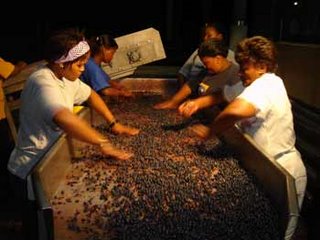 grapes. A relief, because we are never sure what weather is just around the corner; and a celebration; another year of tending the vineyard is complete; wines developing; more lessons learned about our site. This is not to say that work is done; to the contrary, we now have a cellar full of Cabernet waiting to ferment. There are 2 important components to fermentation:
grapes. A relief, because we are never sure what weather is just around the corner; and a celebration; another year of tending the vineyard is complete; wines developing; more lessons learned about our site. This is not to say that work is done; to the contrary, we now have a cellar full of Cabernet waiting to ferment. There are 2 important components to fermentation: that were harvested today…..The sorting table was busy all day with others' grapes, thus we started sorting Block B at 7 p.m. and continued on until midnight. Quite nice…cool, quiet; a pleasant evening until…Bernard went downstairs (the grapes fall by gravity, from the sorting table through a hose, down into a fermenter below in the cellar below) to check the fermenter we were sorting into. To his dismay, the large bottom valve was leaking….slightly thank goodness, but….when he tried to tighten it; it leaked more, indicating that the "leak" was not due to the valve not being tight, but due to someone else in the cellar, who had prepared the tank…forgetting to put a gasket in which would seal the valve firmly to the tank. He put a 50
that were harvested today…..The sorting table was busy all day with others' grapes, thus we started sorting Block B at 7 p.m. and continued on until midnight. Quite nice…cool, quiet; a pleasant evening until…Bernard went downstairs (the grapes fall by gravity, from the sorting table through a hose, down into a fermenter below in the cellar below) to check the fermenter we were sorting into. To his dismay, the large bottom valve was leaking….slightly thank goodness, but….when he tried to tighten it; it leaked more, indicating that the "leak" was not due to the valve not being tight, but due to someone else in the cellar, who had prepared the tank…forgetting to put a gasket in which would seal the valve firmly to the tank. He put a 50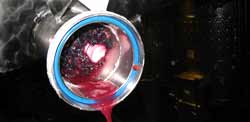 gallon tub under the tank to catch the leak, while we finished sorting. Then we considered the options…none were pretty. And meanwhile these was a 2 hour crusher cleanup to do (washing all parts of the sorting system and then hosing down with high pressure hot water, to be clean for the next day). But what Bernard finally did was quite creative…and photos attached illustrate…
gallon tub under the tank to catch the leak, while we finished sorting. Then we considered the options…none were pretty. And meanwhile these was a 2 hour crusher cleanup to do (washing all parts of the sorting system and then hosing down with high pressure hot water, to be clean for the next day). But what Bernard finally did was quite creative…and photos attached illustrate…  in the original tank. And with the juice gone, the top of the skins was just below the side gate of this tank. So he opened this gate, climbed into the tank, dug down through the grape skins to the valve, and plugged it, from the inside, with a plastic 2 liter plastic bottle!!!! This allowed Teresa, on the outside, to remove the valve, put the gasket in, and put the valve back on. The juice was then moved back into the original tank, dry ice spread on top for protection from oxygen, until fermentation starts.Disaster averted. And they both went home at 5:30 a.m.
in the original tank. And with the juice gone, the top of the skins was just below the side gate of this tank. So he opened this gate, climbed into the tank, dug down through the grape skins to the valve, and plugged it, from the inside, with a plastic 2 liter plastic bottle!!!! This allowed Teresa, on the outside, to remove the valve, put the gasket in, and put the valve back on. The juice was then moved back into the original tank, dry ice spread on top for protection from oxygen, until fermentation starts.Disaster averted. And they both went home at 5:30 a.m. Monitoring fermentation, and planning the work
Monitoring fermentation, and planning the work work goes on first. Back in October, we tasted our wines from the last vintage, and evaluated how well the new barrels of each type had worked with each block and varietal. Based on that…answering the questions: what worked? Which blocks need new oak? Which need once used, or twice used oak (French oak is what we use for wood)?do we have a cooper that we want to test this year?? Etc......we placed a barrel order.Preceding the barrel order we meet with each cooper or cooper's representative. We tell them what we want to accomplish; what we liked or found disappointing about their barrels the previous year, and ask what if any new developments they have in their coopering. Coopering barrels…from selecting the oak, drying it; preparing the staves; assembling the barrel…is very complicated; barrels are from biological elements and take judgement to make, just like wine. Each cooper tends to have a signature style, again like wine. Base on our assessment and their information, and our projection of harvest tonnage by block (a bit difficult since the vines are just budding out at this stage!) we organize our order for new barrels. What we don't do is as follows:
work goes on first. Back in October, we tasted our wines from the last vintage, and evaluated how well the new barrels of each type had worked with each block and varietal. Based on that…answering the questions: what worked? Which blocks need new oak? Which need once used, or twice used oak (French oak is what we use for wood)?do we have a cooper that we want to test this year?? Etc......we placed a barrel order.Preceding the barrel order we meet with each cooper or cooper's representative. We tell them what we want to accomplish; what we liked or found disappointing about their barrels the previous year, and ask what if any new developments they have in their coopering. Coopering barrels…from selecting the oak, drying it; preparing the staves; assembling the barrel…is very complicated; barrels are from biological elements and take judgement to make, just like wine. Each cooper tends to have a signature style, again like wine. Base on our assessment and their information, and our projection of harvest tonnage by block (a bit difficult since the vines are just budding out at this stage!) we organize our order for new barrels. What we don't do is as follows: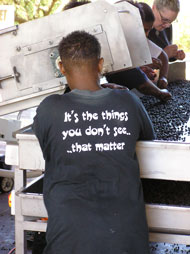
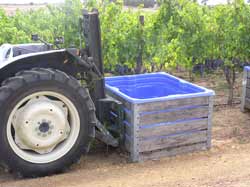 national holiday. This left everyone with little time for harvest, which was not a big problem, since the weather was cool and the grapes were in good condition. It became a problem, however, this week. On Sunday and Monday, Mother Nature reversed herself and sent hot weather rather than cool. The grapes were not pleased. We saw some dehydration and increase in Brix. Suddenly, everyone needs to harvest everything!! Actually, last Thursday I looked at the phenolic samples taken that day. These samples record tannin and color, and at the same
national holiday. This left everyone with little time for harvest, which was not a big problem, since the weather was cool and the grapes were in good condition. It became a problem, however, this week. On Sunday and Monday, Mother Nature reversed herself and sent hot weather rather than cool. The grapes were not pleased. We saw some dehydration and increase in Brix. Suddenly, everyone needs to harvest everything!! Actually, last Thursday I looked at the phenolic samples taken that day. These samples record tannin and color, and at the same 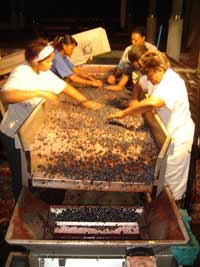 time are checked for grape chemistry. I was delighted to see the results; our grape "ripeness chemistry" was excellent - the relation of Brix, acid and pH, and color and tannin. And we were getting ripeness at lower sugars than 2005.If I had control of the weather I would have ordered a week of mild days, say 75 - 80 F. Winemakers always yearn for control of weather. It did not come to me. So now, everything is ready, to come in, and indeed we will be will be going full speed with harvest this week. Meanwhile, we are working very long days.
time are checked for grape chemistry. I was delighted to see the results; our grape "ripeness chemistry" was excellent - the relation of Brix, acid and pH, and color and tannin. And we were getting ripeness at lower sugars than 2005.If I had control of the weather I would have ordered a week of mild days, say 75 - 80 F. Winemakers always yearn for control of weather. It did not come to me. So now, everything is ready, to come in, and indeed we will be will be going full speed with harvest this week. Meanwhile, we are working very long days. Today Julie, and friend and visitor Mary Ann Graf from California, worked from 8 am to 6 pm, in the vineyard, sorting grapes as they were harvested into our bins. In the heat, some small clusters had shriveled and needed to be discarded. Tonight (starting 9 p.m.) we will crush these, and Bernard and I will be sorting clusters for the final touch up. And so it will go all week.
Zelma Long
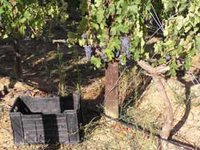
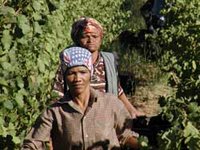 one of our most concentrated, and has very solid tannins; it is a major "building block" of the longevity of our wines. Below are some photos taken as harvest was starting this morning:
one of our most concentrated, and has very solid tannins; it is a major "building block" of the longevity of our wines. Below are some photos taken as harvest was starting this morning: Cape weather, similar to California’s north coast, comes in cycles of temperature. See below Phil’s weather graph for February, and watch how warm and cool cycles over 3-5 days. This chart by Phil Freese, taken from weather station near Fairview, 2.06 Graph shows max and min
Cape weather, similar to California’s north coast, comes in cycles of temperature. See below Phil’s weather graph for February, and watch how warm and cool cycles over 3-5 days. This chart by Phil Freese, taken from weather station near Fairview, 2.06 Graph shows max and min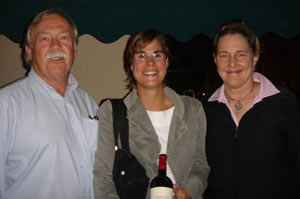 Laura Bunzel, sommelier and wine buyer for the Burj Al Arab hotel in Dubai who has been staying with Mike for a week, joined Bernard and I while we checked Brix, and temperature of our fermenters and tasted them, to see what their "Sunday needs" would be. Harvest brings visitors; those who want to get a first hand feel for wine growing and winemaking. Friday, Laura had joined Phil in the early a.m. for harvest (of Merlot Block E). After an overview of our winegrowing, she helped Julie document vine details (shoot length, etc) for Phil. Julie does this in every block near harvest...One of the nice thing about visitors, and Laura exemplifies this, is their interest and curiosity. She had seen several other wineries and was curious to discuss the different winemaking techniques that are used. For example, she asked why we didn't harvest all our blocks together for a field blend
Laura Bunzel, sommelier and wine buyer for the Burj Al Arab hotel in Dubai who has been staying with Mike for a week, joined Bernard and I while we checked Brix, and temperature of our fermenters and tasted them, to see what their "Sunday needs" would be. Harvest brings visitors; those who want to get a first hand feel for wine growing and winemaking. Friday, Laura had joined Phil in the early a.m. for harvest (of Merlot Block E). After an overview of our winegrowing, she helped Julie document vine details (shoot length, etc) for Phil. Julie does this in every block near harvest...One of the nice thing about visitors, and Laura exemplifies this, is their interest and curiosity. She had seen several other wineries and was curious to discuss the different winemaking techniques that are used. For example, she asked why we didn't harvest all our blocks together for a field blend (answer: (1) they get ripe at different times; (2) we want to see, after fermentation, which will be suitable for Series C and Series M). I told her … every winemaker has a different approach…and that makes wines diverse and intriguing. It is not a matter of "right technique" or "wrong technique" but how they all fit together and most important, how they work with the grapes, and the winery's vision.For Vilafonte, the grapes drive our decisions. That is why we collect data on our vines…to know them very very well, each vintage. Laura says she fell in love with the Cape.
(answer: (1) they get ripe at different times; (2) we want to see, after fermentation, which will be suitable for Series C and Series M). I told her … every winemaker has a different approach…and that makes wines diverse and intriguing. It is not a matter of "right technique" or "wrong technique" but how they all fit together and most important, how they work with the grapes, and the winery's vision.For Vilafonte, the grapes drive our decisions. That is why we collect data on our vines…to know them very very well, each vintage. Laura says she fell in love with the Cape. 